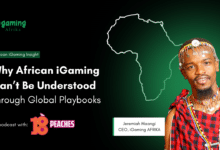Exclusive: Jeremiah Maangi shares Insights on Growth, Challenges, and Responsible Gamification

Jeremiah Maangi, CEO of iGaming AFRIKA, provides a comprehensive overview of the evolving online betting industry in Kenya, the largest economy in East Africa. With years of experience in the iGaming sector, Jeremiah shares his insights into the rapid growth of online betting, the role of mobile technology and microtransactions, and the unique challenges faced by the industry, including heavy taxation and outdated regulatory frameworks. He also discusses the importance of responsible gaming practices, particularly in the context of gamification, and the potential risks associated with this trend. Through his work, Jeremiah aims to promote a balanced approach that prioritises player well-being while fostering sustainable growth in the African gambling market. Jeremiah Maangi Responsible Gaming
- Could you outline your background, what you do at iGaming Afrika, and how your experience intersects with gamification within the Kenyan-regulated online betting industry?
Jeremiah: At iGaming AFRIKA, we provide premier B2B and B2C gambling media services, focusing on delivering comprehensive information to the betting community across Africa. We are proud to be recognised as the foremost source for industry insights about casinos, sportsbooks, and lotteries, offering a wide range of content, including news, podcasts, webinars, interviews, and updates on the gambling industry landscape in Africa. Jeremiah Maangi Responsible Gaming
We aim to remain the leading information provider within Africa’s igaming industry, and I believe that our work so far is a testament to our dedication.
- Can you provide a brief overview of the regulated online betting industry in Kenya, the biggest East African economy? What are the key challenges and opportunities it faces?
Jeremiah: In recent years, we have witnessed substantial growth in the Kenyan gaming industry, and I believe that we are yet to see even better developments in the gambling sector in Kenya. While progress is evident, challenges persist, notably in regions where gambling stigma remains prevalent. However, the increasing number of punters reflects a positive trend. Some of the notable key challenges include the heavy taxation levied on operators and punters alike and outdated regulatory frameworks that hinder industry development. Addressing the disparities in our sector is crucial for promoting unity and sustainable growth. I am pleased that the proposed changes, which will come into effect if the bill before parliament is passed into law, are taking a proactive approach to addressing these issues.
- How have online betting user numbers grown in Kenya over the past decade? What factors do you attribute this surge to?
Jeremiah: The gaming sector has experienced remarkable growth in our country. Despite the imposition of additional taxes, entities such as Safaricom and the Kenya Revenue Authority have reported substantial profit increases annually. Additionally, Kenya’s youthful demographic, representing the largest target market, contributes to the sector’s expansion and this means that the number of punters has significantly risen over the last decade.
The surge in digitalisation, particularly the rise of mobile gambling and improved internet accessibility, has also significantly influenced the trajectory of Kenya’s betting industry and the number of punters we have who are actively participating.
Read Also: Bragg Gaming Signs Exclusive Content and Aggregation Deal with Mozzart Bet
- How has mobile technology, particularly the use of microtransactions (“in-app purchases, etc”), impacted online betting uptake in Kenya?
Jeremiah: The transition of gambling to online platforms has been facilitated by the widespread adoption of technologies such as smartphones, high-speed internet, and mobile money platforms, allowing for phone-based payments without requiring a traditional bank account. Presently, gambling occurs in diverse locations, ranging from urban centres to remote villages.
Given that Kenya spearheaded the introduction of the first mobile money application on the continent (M-Pesa), the use of mobile money has been ingrained in our business practices for many years. The advent of online betting capitalised on this existing infrastructure, and with the ongoing digitisation trends, we anticipate further proliferation of online betting in the future.
- Gamification tactics can foster a fun and competitive environment, while also potentially exploiting psychological vulnerabilities. How might the industry address this complex issue?
Jeremiah: To navigate the ethical considerations surrounding gamification in the gaming industry, it’s crucial for stakeholders to prioritise player well-being. Implementing transparent and responsible design practices, such as clear disclosure of odds and limits, can empower players to make informed decisions. Additionally, incorporating robust age verification measures and offering resources for responsible gaming can help mitigate potential harm. Jeremiah Maangi Responsible Gaming
Collaboration between industry leaders, regulators, and experts in psychology and ethics can further enhance efforts to promote ethical gamification practices that prioritise player safety and enjoyment.
- Have you observed any data-driven insights on how gamification in online betting might lead to problem gambling and potential financial hardship for users?
Jeremiah: While data-driven insights specifically linking gamification in online betting to problem gambling and financial hardship may be limited, there’s growing concern about the potential risks associated with these practices. The proliferation of online betting platforms, often featuring gamified elements like leaderboards, rewards, and interactive features, has raised alarms about their impact on vulnerable individuals.
Reports, albeit from some time back by Finance Uncovered suggest that in regions like Kenya, where online gambling is prevalent, there’s a significant portion of the population facing gambling addiction and related financial difficulties. However, further research and data analysis are needed to establish more concrete connections between gamification strategies and problem gambling outcomes. Nonetheless, these insights underscore the importance of implementing responsible gaming measures and regulatory oversight to safeguard users and mitigate potential harm.
- Are there specific age groups, genders, or income levels that seem more susceptible to problem gambling in Kenya? Any thoughts as to why this is the case?
Jeremiah: In my assessment, individuals from the lower middle-class and lower-class demographics appear to be particularly susceptible to problem gambling. This susceptibility may stem from the allure of substantial monetary rewards promised by gambling activities. Situated within an economic landscape that may not be conducive, the prospect of easy financial gains can foster a misconception among many individuals. It’s crucial to recognise that in such circumstances, the recreational nature of gambling may be overshadowed, leading individuals to overlook the potential risks involved.
- Looking ahead, how do you see technology like Artificial Intelligence impacting gamification and responsible gambling practices?
Jeremiah: Artificial Intelligence (AI) holds immense potential to transform both gamification and responsible gambling practices. In terms of gamification, AI can personalise the gaming experience based on individual preferences and behaviour patterns, enhancing user engagement while minimising the risk of addiction.
Moreover, AI can play a crucial role in promoting responsible gambling practices. By analysing vast amounts of data, AI algorithms can identify early signs of problem gambling behaviour, such as excessive spending patterns or extended gaming sessions. This enables operators to intervene proactively, offering personalised interventions or self-exclusion options to at-risk players.
- What regulations or industry standards do you think would be most effective in achieving a balance between a safe and entertaining experience for users and safeguarding against abuse? Can such a balance coexist with the industry’s profit motive?
Jeremiah: Responsible gambling stands as one of the paramount concerns within the gaming industry. I believe it’s essential to recognise the existing regulatory framework and standards aimed at fostering responsible gambling practices. Once that is done, then we can see areas that need to be improved so that we can have updated regulations that would help ensure that the responsible gaming objectives are achieved. Furthermore, we should learn from developed countries. The regulations in place in these countries serve this purpose effectively. Regulators play a vital role in safeguarding the well-being of all involved, including punters. Should gambling become uncontrolled, it poses risks to both operators and punters alike. Establishing a beneficial status quo requires a collaborative effort from regulators to stakeholders. Embracing moderation collectively ensures a safer and more sustainable environment for everyone involved. Jeremiah Maangi Online Betting
- Do NGOs, Trusts, and other organisations dedicated to awareness and literacy around problem gambling in Kenya make a significant difference, in your view?
Jeremiah: In my view, NGOs, Trusts, and other organisations dedicated to awareness and literacy around problem gambling in Kenya play a vital role in promoting responsible gaming practices and supporting individuals who are struggling with gambling addiction. Their efforts have made a significant difference in raising awareness about the risks of gambling addiction and promoting responsible gaming practices. Jeremiah Maangi Responsible Gaming
- Based on your experience and observations, what are the most crucial lessons that users, platforms, and regulators should take away regarding the responsible use of gamification in online betting?
Jeremiah: The responsible use of gamification in online betting requires a multifaceted approach. Users should prioritise self-awareness and set limits on their gambling activities, recognising when it becomes excessive. Platforms must implement robust safeguards, such as age verification measures and responsible gaming tools, to protect users from potential harm.
Regulators should continuously review and update regulations to ensure they effectively address the evolving challenges of gamification, prioritising consumer protection above all else. Collaboration between users, platforms, and regulators is key to fostering a safe and enjoyable online betting environment while mitigating the risks associated with excessive gambling. Jeremiah Maangi OResponsible Gaming
- Is there anything specific you believe the online betting industry in Kenya, or Africa more broadly, should do to address the potential risks associated with gamification? Are there any other issues you would add to this interview, and the conversation around problem gambling in Africa generally, and Kenya specifically?
Jeremiah: I strongly believe that betting companies in Kenya, and indeed across Africa, have a crucial role to play in ensuring responsible gaming practices. As the primary providers of gaming services, they have a vested interest in promoting a safe and responsible gaming environment for their customers.
Furthermore, I believe that betting companies should take a proactive approach to addressing problem gambling by providing access to counselling services and other forms of support for those who may be struggling.
In addition to these measures, I would like to see more emphasis placed on educating consumers about the risks associated with gambling and promoting responsible gaming practices through public awareness campaigns. Jeremiah Maangi Online Betting
About Jeremiah Maangi
Jeremiah is an outstanding figure in the African b2b and b2c iGaming ecosystem. He is driven by the desire to alleviate the continent’s high rate of unemployment by championing the ‘Invest in Africa’ agenda. An ardent crypto enthusiast campaigning for change in the African Fintech world through the adoption of cryptocurrencies as a means of exchange and payment throughout the continent. Jeremiah is also a marketing and investment professional with extensive experience in advertising, marketing, and startup consulting for African gambling businesses. He is the current CEO of iGamingAFRIKA.com and Founding Director of iGaming Consult Africa (Formerly Bizin Africa). Jeremiah Maangi Responsible Gaming























